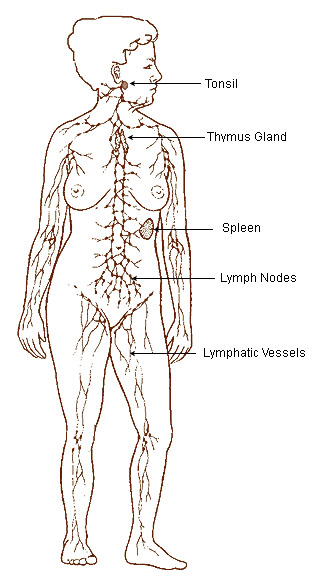The immune system protects the body like a guardian from harmful influences from the environment and is essential for survival. It is made up of different organs, cells and proteins and aside from the nervous system, it is the most complex system that the human body has.
The tasks of the immune system
Without an immune system, a human being would be just as exposed to the harmful influences of pathogens or other substances from the outside environment as to changes harmful to health happening inside of the body. The main tasks of the body's immune system are:
- Neutralizing pathogens like bacteria, viruses, parasites or fungithat have entered the body, and removing them from the body
- Recognizing and neutralizing harmful substances from the environment
- Fighting against the body's own cells that have changed due to an illness, for example cancerous cells.
Cells and Organs of the Immune System
The immune system includes primary lymphoid organs, secondary lymphatic tissues and various cells in the innate and adaptive immune systems.
- The key primary lymphoid organs of the immune system are the thymus and bone marrow, and secondary lymphatic tissues such as spleen, tonsils, lymph vessels, lymph nodes, adenoids, and skin and liver.
- Leukocytes (white blood cells) act like independent, single-celled organisms and are the second arm of the innate immune system.
- The innate leukocytes include the phagocytes ( macrophages, neutrophils, and dendritic cells ), mast cells, eosinophils, basophils, and natural killer cells. These cells identify and eliminate pathogens and are also important mediators in the activation of the adaptive immune system.
- The cells of the adaptive immune system are special types of leukocytes, called lymphocytes. B cells and T cells are the major types of lymphocytes and are derived from hematopoietic stem cells in the bone marrow.
- The lymphatic system is a part of the circulatory system, comprising a network of conduits called lymphatic vessels. The lymphatic system has multiple functions such as the transportation of white blood cells to and from the lymph nodes into the bones
Immune System Organs
The key primary lymphoid organs of the immune system include the thymus and bone marrow, as well as secondary lymphatic tissues including spleen, tonsils, lymph vessels, lymph nodes, adenoids, skin, and liver.
The thymus “educates” T cells and provides an inductive environment for the development of T cells from hematopoietic progenitor cells. The thymus is largest and most active during the neonatal and pre-adolescent periods of development. By the early teens, the thymus begins to atrophy and thymic stroma is replaced by adipose tissue. Nevertheless, residual T-lymphopoiesis continues throughout adult life.
Bone marrow is the flexible tissue found in the interior of bones. In humans, red blood cells are produced in the heads of long bones. The red bone marrow is a key element of the lymphatic system, being one of the primary lymphoid organs that generate lymphocytes from immature hematopoietic progenitor cells. Bone marrow and thymus constitute the primary lymphoid tissues involved in the production and early selection of lymphocytes.
The lymphatic system is a part of the circulatory system, comprising a network of conduits called lymphatic vessels that carry a clear fluid, called lymph, unidirectionally towards the heart. The lymphatic system has multiple interrelated functions including the transportation of white blood cells to and from the lymph nodes into the bones, and the transportation of antigen -presenting cells (such as dendritic cells) to the lymph nodes where an immune response is stimulated. Lymphoid tissue is found in many organs, particularly the lymph nodes.

The Lymph Nodes and Lymph Vessels in Human Beings: The lymphatic system is a part of the circulatory system, comprising a network of conduits called lymphatic vessels that carry a clear fluid called lymph.
The spleen is similar in structure to a large lymph node and acts primarily as a blood filter. It synthesizes antibodies in its white pulp and removes antibody-coated bacteria along with antibody-coated blood cells by way of blood and lymph node circulation.
The palatine tonsils and the nasopharyngeal tonsil are lymphoepithelial tissues located near the oropharynx and nasopharynx. These immunocompetent tissues are the immune system’s first line of defense against ingested or inhaled foreign pathogens. The fundamental immunological roles of tonsils aren’t yet understood.
Lymph nodes are distributed widely throughout areas of the body, including the armpit and stomach, and linked by lymphatic vessels. Lymph nodes are garrisons of B, T and other immune cells. Lymph nodes act as filters or traps for foreign particles and are important in the proper functioning of the immune system. They are packed tightly with the white blood cells, called lymphocytes and macrophages.
The skin is one of the most important parts of the body because it interfaces with the environment, and is the first line of defense from external factors, acting as an anatomical barrier from pathogens and damage between the internal and external environment in bodily defense. Langerhans cells in the skin are part of the adaptive immune system.
The liver has a wide range of functions, including immunological effects—the reticuloendothelial system of the liver contains many immunologically active cells, acting as a “sieve” for antigens carried to it via the portal system.
- ymphocytes: A lymphocyte is a type of white blood cell in the vertebrate immune system. The three major types of lymphocyte are T cells, B cells and natural killer (NK) cells. T cells (thymus cells) and B cells (bursa-derived cells) are the major cellular components of the adaptive immune response.
- Leukocytes: Cells of the immune system involved in defending the body against both infectious disease and foreign materials. Five different and diverse types of leukocytes exist.


 0
0

